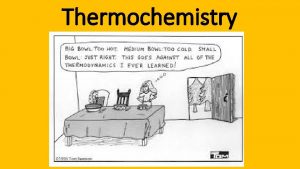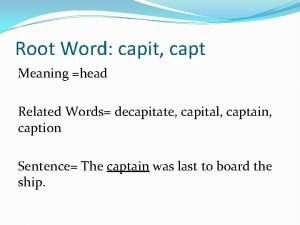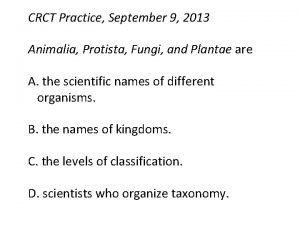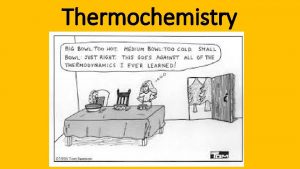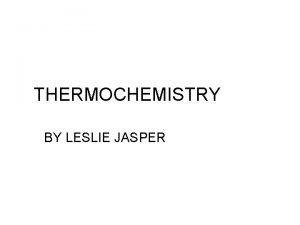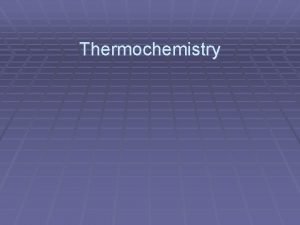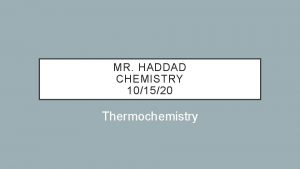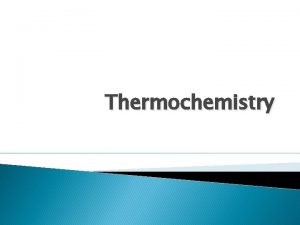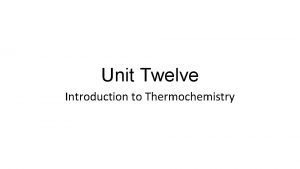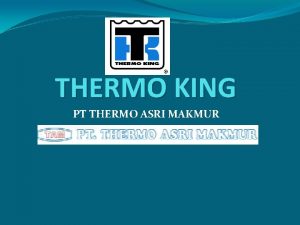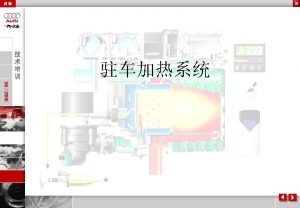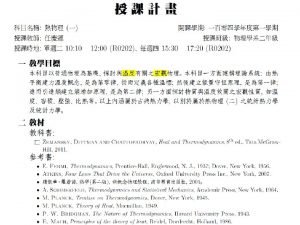Thermochemistry What does the prefix thermo mean Thermochemistry











- Slides: 11

Thermochemistry

What does the prefix thermo mean? Thermochemistry is the study of the heat associated with a chemical or physical change. Heat ≠ Temperature Heat (symbolized by Q or H) is transferable “radiant” energy (enthalpy) Units – joules (J), kilojoules (k. J), calories (cal) and kilocalories (kcal) = Calories (Cal) Food calories 4. 184 J = 1 cal

When we study Heat of a System it is important to know if heat is increasing or decreasing… Heat is a product Exothermic = Enthalpy “OUT” (Heat) Heat is a reactant Endothermic = Enthalpy “IN” (Heat)

When we study Heat of a System it is important to know if heat is increasing or decreasing…

Heat ≠ Temperature (T) – is a measure of the differences in enthalpy between two objects Units – Degree Celsius or Kelvin How much Enthalpy (heat) in joules does the combustion of methane release if it releases 45 calories of heat energy?

The relationship between Heat from temperature is muddled: Depends on what substance… how much substance… and how much energy is available…. Specific Heat Capacity (Cp): The amount of heat required to raise the temperature of 1 gram of substance by 1 degree Celsius Units: J or g °C cal g °C ** Specific Heat of water is 4. 184 J/g°C or 1 cal/g°C **

Q is heat change as a result of a temperature change Calorimeter = tool used to measure heat changes Q = mass x change in Celsius temperature x specific heat capacity of the substance Q = m (Tf – Ti) Cp Q = m. CΔT Example: How much heat is required to raise the temperature of 2. 5 g of water by 12. 5°C?

Complete the following specific heat practice problems in your notebook. 1. 5. 0 g of copper was heated from 20°C to 80°C. How much energy was used to heat Cu? (Specific heat capacity of Cu is 0. 092 cal/g°C) 2. How much heat is absorbed by a 20 g granite boulder as energy from the sun causes its temperature to change from 10°C to 29°C? (Specific heat capacity of granite is 0. 79 J/g°C) 3. How much heat is released when 30 g of water at 96°C cools to 25°C?

1. 5. 0 g of copper was heated from 20°C to 80°C. How much energy was used to heat Cu? (Specific heat capacity of Cu is 0. 092 cal/g°C) Q = m. CΔT = 5. 0 g (0. 092 cal/g°C) (80 – 20) = 27. 6 30 cal

2. How much heat is absorbed by a 20 g granite boulder as energy from the sun causes its temperature to change from 10°C to 29°C? (Specific heat capacity of granite is 0. 79 J/g°C) Q = m. CΔT = 20 g (0. 79 J/g°C) (29 -10) = 300. 2 300 J

3. How much heat is released when 30 g of water at 96°C cools to 25°C? Q = m. CΔT = 30 g (4. 184 J/g°C) (25 -96) = -8911 -9000 J
